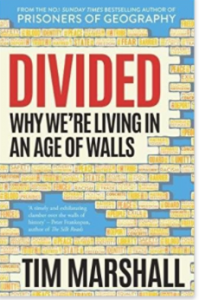
Tim Marshall’s gripping analysis of walls


In this of age openness, globalisation, Walls and the Indian Salt Hedge, built not of stone or indeed of salt but the thorniest vegetation India could provide, Tim Marshall explores why the British Salt tax was both unfair and unwise and had a little moral right to impose it. The British tended to the hedge which was 12 feet high and 14 feet thick jagging over 2, 500 miles from India’s left to right, from 1840s to1879, using it to cramp the smuggling of untaxed salt.
Time eventually sheared down the Indian salt hedge as most walls we built have crumbled, yet we keep building new ones. The Berlin Wall has been down longer than it was up. Half of all border walls erected around 1945 have appeared in this century.
Marshall devotes eight chapters by discussing a barrier: the Great Wall of China, The Moroccan Wall, a berm of sand slaloming through Western Sahara, The double-layered fence separating India from Bangladesh, the concrete slice between Israel and the West Bank. These walls are only physical exhibitions of deeper disunities.
In China, invisible fissures set apart rural people from urban, the Han from other ethnic minorities and older generations from younger.
China has changed over the past half-century. Marshall highlights the ancient hatreds, animosities that have boiled forever. In the developing world the ancient hatreds, animosities that have boiled over, the one –dimensional identity is defended with atavistic violence. Marshall blames the faults in Africa to segmented tribes, religion in the Middle East. He limits the pernicious effects of colonialism merely to thoughtlessly draw borders, a final act of haste before the European powers vacated the premises.
Donald Trump’s proposed wall of the US-Mexico border is a ruse, culminating white anxieties about the economic and demographic transitions existing around the country and rapture of racism has yet to be sealed.
Divided exhibits a deterministic streak, and delves into many reasons why we erect walls, because we are divided in many ways: wealth, race, religion and politics. In Europe, the ruptures of the past decade threaten not only European unity but in some countries liberal democracy itself. Understanding what has divided us, past and present, is essential to understanding much of what’s going on in the world today.
Divided: Why We’re Living in an Age of Walls by Tim Marshall, Elliott & Thompson £16.99, 272 pages.
